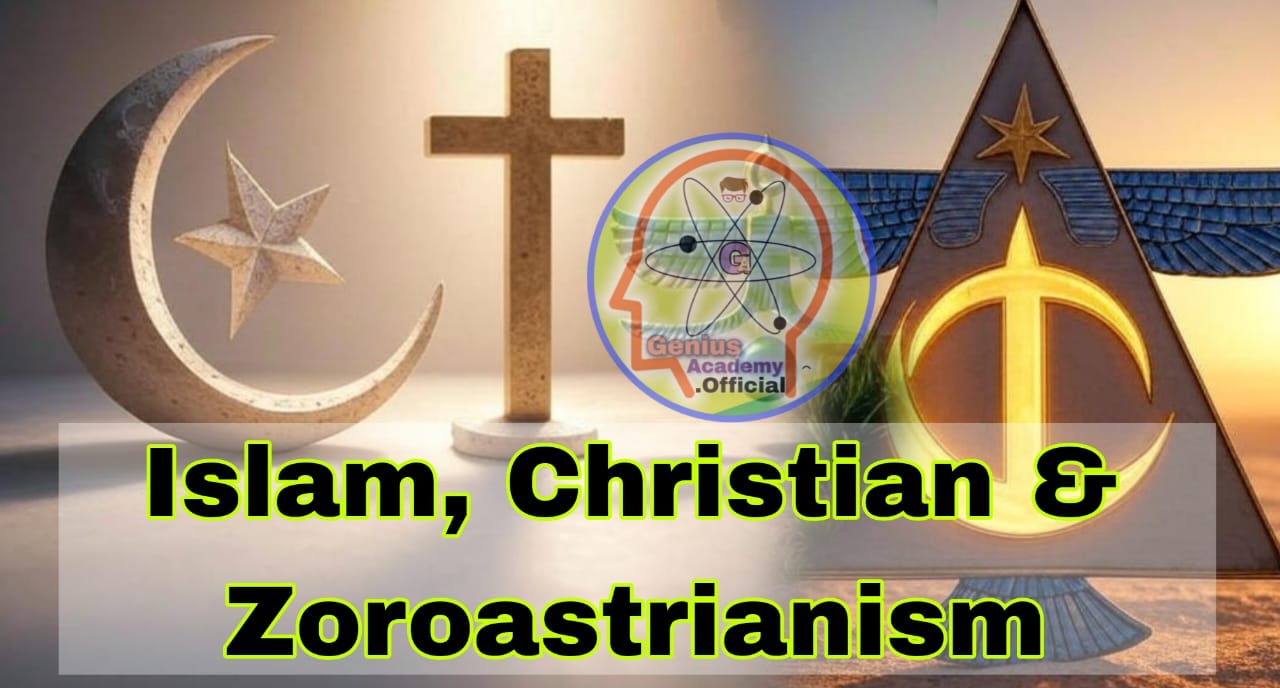Islam: Origin, Beliefs, and Spread
The founder of Islam is Prophet Muhammad (Hazrat Muhammad Sahib).
- He was born in Mecca (in present-day Saudi Arabia) in 570 AD.
- His father’s name was Abdullah, and his mother’s name was Amina.
- He belonged to the Quraysh tribe, a respected tribe of Mecca.
- Muhammad was orphaned at a young age and was raised by his grandfather and then his uncle.
- At the age of 25, he married a wealthy widow named Khadija, who supported him in his spiritual journey.
- In 610 AD, while meditating in the Cave of Hira near Mecca, he received the first revelation from Angel Gabriel (Jibreel).
- The angel Gabriel revealed to him the words of Allah (God), which were later compiled as the Quran, the holy book of Islam.
- These revelations continued for 23 years, until his death in 632 AD.
- The Quran was revealed in Arabic and contains guidance for all aspects of life.
- In 622 AD, due to increasing opposition in Mecca, Muhammad migrated to Medina (then called Yathrib).
- This migration is known as the Hijra, and the Islamic (Hijri) calendar begins from this event.
- This journey took place on 24th September, 622 AD.
- Prophet Muhammad’s daughter was Fatima, and her husband was Ali, who became an important figure in Islamic history.
- Prophet Muhammad preached the oneness of God (Tawhid), social justice, charity, kindness, and devotion to Allah.
- He passed away on 8th June, 632 AD, and was buried in Medina, which became a holy city for Muslims.
After the Prophet’s death, differences arose regarding his rightful successor, which led to the formation of two major sects:
| Sect | Beliefs |
|---|---|
| Sunni | Follow the Sunnah (traditions) of the Prophet Muhammad. They believe that the Prophet’s companions chose his successors (Caliphs). |
| Shia | Believe that Ali, the Prophet’s son-in-law, was his rightful successor. They give special importance to his descendants (Imams). |
- Ali was assassinated in 661 AD.
- His son Hussein was killed in 680 AD in the Battle of Karbala (in Iraq), a major event in Shia history that defines their beliefs and rituals.
- Caliphs were the successors of the Prophet and led the Muslim community.
- The position of Caliph continued until 1924 AD, when it was abolished by Mustafa Kemal Pasha (Atatürk) in Turkey.
- The first biography of the Prophet was written by Ibn Ishaq.
- Eid-e-Milad-un-Nabi is celebrated as the birth anniversary of Prophet Muhammad.
- Namaz (Salat) is the Islamic prayer. Muslims face Mecca while praying. In India, Mecca lies to the west, and this direction is called Kibla.
- Islam first entered India through Arab traders and military campaigns.
- In 712 AD, the Arab general Muhammad bin Qasim conquered Sindh, making Islam a major religion in that region.
Christianity: Origin and Beliefs
The founder of Christianity is Jesus Christ (also called Jesus of Nazareth or Isa in Islam).
- Jesus was born around the beginning of the 1st century at Bethlehem, near Jerusalem.
- His mother’s name was Mary, and his foster father was Joseph, a carpenter.
- He spent the first 30 years of his life in Nazareth, working as a carpenter.
- Jesus began preaching at the age of 30, teaching love, forgiveness, peace, compassion, and faith in one God.
- His first two disciples were Andrew and Peter.
- His followers believed him to be the Son of God and the Messiah (Saviour).
- Jesus was crucified in 33 AD under the order of Roman governor Pontius Pilate.
- Christians believe he rose from the dead on the third day after crucifixion (celebrated as Easter).
- The central belief in Christianity is the Trinity – the unity of God the Father, God the Son (Jesus), and God the Holy Spirit.
- The cross is the most important symbol of Christianity, representing Jesus’ sacrifice.
- The Bible is the holy scripture of Christians. It is divided into two parts:
- Old Testament – shared with Judaism.
- New Testament – focuses on the life and teachings of Jesus.
- Christmas is celebrated as the birth anniversary of Jesus.
- From the 12th century onwards, a new architectural style called Gothic became popular in Christian churches in Europe.
- Notre-Dame Cathedral in Paris is a famous example of Gothic architecture, known for its tall structure and stained glass.
Zoroastrianism (Parsi Religion)
The prophet of Zoroastrianism (also called Parsi religion) is Zarathustra (also known as Zoroaster).
- It is one of the oldest monotheistic religions, originating in ancient Iran.
- Followers believe in one supreme God called Ahura Mazda.
- The religion teaches the principle of “Good Thoughts, Good Words, Good Deeds”.
- The sacred text of Zoroastrianism is the Zend Avesta, which contains the teachings, prayers, and rituals revealed to Zarathustra.
- Zoroastrians are often referred to as “fire-worshippers” because they consider fire a symbol of purity and the presence of God.
- Their places of worship are called Fire Temples, where a sacred fire is kept burning continuously.
Related Chapters:— (Click on the chapter number button below to select one of the chapter numbers given below.)

